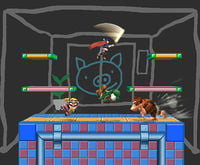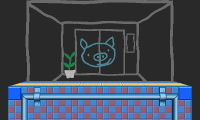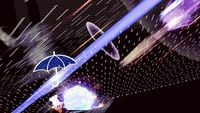WarioWare, Inc.
| WarioWare, Inc. | |
|---|---|
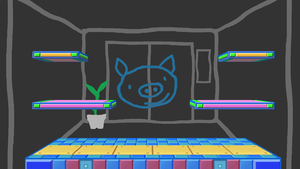 WarioWare, Inc. in Super Smash Bros. Ultimate. 
| |
| Universe | Wario |
| Appears in | Brawl SSB4 (3DS) Ultimate |
| Availability | Starter (Brawl and Ultimate) Unlockable (SSB4) |
| Unlock criteria | Unlock Wario. |
| Crate type | Presents |
| Tracks available | In Brawl: WarioWare, Inc. WarioWare, Inc. Medley Ashley's Song Ashley's Song (JP) Mike's Song Mike's Song (JP) Mona Pizza's Song Mona Pizza's Song (JP) Bolded tracks must be unlocked In SSB4: WarioWare, Inc. Ashley's Song/Ashley's Song (JP) (Alternate) |
| Article on Super Mario Wiki | WarioWare, Inc. (company) |
WarioWare, Inc. (メイド イン ワリオ, Made in Wario) is a stage in Super Smash Bros. Brawl, Super Smash Bros. for Nintendo 3DS and Super Smash Bros. Ultimate. It takes its name, as well as its theme, from the WarioWare franchise. Often, the stage takes players from the main "elevator" into a microgame, and allows them to compete to obtain some sort of award.
Stage description
A unique feature is the Microgames which allow players to earn rewards when completed. Some microgames are able to damage characters, such as Kitty Cover. Once a game ends, the winners and losers (those who accomplished the goal and those who didn't) are marked with red Os and blue Xs respectively. The winners get rewards such as Super Mushrooms, Stars, item drops and even damage recovery. Not every microgame can be won by all participants, however. Occasionally, two microgames will take place in quick succession. Players will only receive rewards for the second game. Occasionally, between microgames, the players will return to the elevator room, but the stage's platforms will not return, and instead, the players will walk around on an invisible floor, as they do in the microgames. This status of the stage does not last long, though.
In the WarioWare games, microgames had three difficulty levels, which has been implemented in the WarioWare stage, but difficulties seem to be as random as the game selection. For most microgames, the rise in difficulty simply makes it harder to complete. A few of them, however, keep the same task but give a shorter time limit for the players to finish it in. A new microgame begins around every 30 seconds during a match on this stage.
If one is playing using the Wii Remote, the Nunchuk, the Classic Controller, or the Nintendo 3DS, the mini-speaker in that controller will play Wario's comment on the success (or failure) on the microgame.
The "Elevator Room" is a recurring level in WarioWare games in which every possible microgame in the game can appear. The animal drawn on the Elevator is different for every game. In Brawl's case, the pig comes from the original Wario Ware Inc.: Mega Microgame$. The expression on the pig's face changes to reflect whether the microgame was won or lost. If somebody achieves the goal, it will become cheerful, but if everyone loses, it frowns and its eyes turn into crosses. In training mode, even when computers are set to stand, they will still participate in microgames.
Microgames
All of the microgames in this stage come from a WarioWare game with the exception of "Don't Move" and "Taunt". The following microgames appear in the stage:
| Name | Command | Description | Image |
|---|---|---|---|
| Arrow Space | Sidestep! | Originates from Mega Microgame$. A tiny ninja outside a Japanese fortress in the background is target of a wall of arrows raining from above, and the player originally had to move the ninja with the D-Pad into the area where there was a gap between the arrows. In Smash, fighters also have to avoid these arrows, either via moving into the gap similarly to the original game, or by closely navigating to the edges of the stage, putting them in closer proximity to the blast lines. Players who successfully avoid the arrows are given a reward. While the ninja from the original game appears in the background, he has no effects on gameplay. | 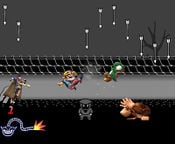
|
| Blowin' Up | Pop it! / Pop! | Originates from Touched! A series of party poppers appear in the air. In Touched!, the player had to use the stylus to pull the strings on the crackers and make the confetti fire out. The appearance of the stage also changed with the difficulty level, with the image either being that of a birthday, a wedding, or a Halloween party; the Japanese version of the game featured a man with a necktie around his head instead of the Halloween party. In Smash, characters just have to attack the party poppers to set them off; emulating the source game, the image in the background depends on how many poppers there are, though unusually, the image of the man with a necktie around his head appears in all regions. Anyone who successfully attacks a popper will be given a reward, but only if all poppers have been attacked. In matches involving four players, this is the only minigame that does not allow for all players to win. | 
|
| Crack Down | Jump! | Originates from Mega Microgame$. A giant with a hammer in the background smashes down on a mountain to generate an earthquake, while the player has to make a chicken jump up in the air to avoid the tremor from knocking an egg loose from its back. In Smash, players must accomplish the same feat, gaining a reward if they do so; being on the ground at the time of the tremor will result in being buried and fail the microgame. Unusually, the chicken itself does not appear in the stage. | 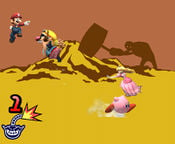
|
| Crazy Cars | Dodge! | Originates from Mega Microgame$. In the original game, players had to make Wario avoid a car (represented either as a sausage, a shark, or a potato) charging at them; the car itself could either charge forward, jump, or stop in place, then either continue charging forward or instead turn away. In Smash, an arrow warns the player of which direction the car will jump, a feature not present in the original microgame. Dodging the car's path grants the player a reward; getting hit by the car inflicts damage with high horizontal knockback. Shielding is not sufficient, even if the player takes no damage; winning the microgame requires avoiding contact with the car altogether. | 
|
| Don't Move | Don't move! | This game is unique to Smash, though it takes inspiration from the microgame of "Fragile!" from Twisted!, where the player had to keep the Game Boy Advance completely still to avoid activating the game's sensor and knock over a stack of eggs. In the microgame, a marble statue of a man sits in the background, with no music playing. In order to beat the microgame, players need to abstain from inputting any sort of command, including attacking, moving, or even shielding. While getting hit by an attack causes the player to move, they will still win the game should they continue to abstain from inputting any commands. Unlike Fragile! It uses Dodge Balls' theme. | 
|
| Kitty Cover | Stay dry! | Originates from Mega Microgame$. A cat walks around in a rainstorm, and the player originally had to move an umbrella so that the cat would remain dry. In Smash, characters have to stay under the umbrella, and not get wet. The rain does minor damage to all fighting characters as long as they stand underneath it; the rain does not immediately damage players, however, and it is possible to win the game even if one's character stands in the rain for a brief moment as long as no damage is accrued. | 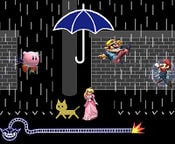
|
| Lose Your Marble | Chisel it! / Chisel! | Originates from Touched! Players originally had to use the touch screen to chisel away at the block to reveal a statue, which took the form of either an Easter Island statue with lipstick, Michelangelo's David wearing a Speedo, or a statue of a toilet, depending on the difficulty. In Smash, players have to attack the marble block in order to reveal the statue. If the statue is completely unveiled before time runs out, all players who contributed receive a reward; if the statue is incomplete, then all players lose. | 
|
| Sole Man | Dodge! | Originates from Mega Microgame$. In the original game, players had to guide Fronk from left to right to avoid being stomped, with higher difficulties featuring wider soles to avoid. In Smash, Fronk does not appear, though members of his species can still be seen in the background. Being hit by the sole causes the bury effect, much like Crack Down. Players who avoid being hit by the sole are rewarded. | 
|
| Taunt | Taunt! | This stage is unique to Smash, much like Don't Move. In the stage, the player must taunt when the camera flashes in order to win; being attacked while taunting still allows for a victory. In the background, the recurring character of Jimmy T. can be seen. | 
|
Microgame Music
The following tracks play during these respective microgames, as long as the My Music track in use for the match is WarioWare, Inc. They are all new arrangements from the originals, and cannot be found in the Sound Test.
- Crazy Cars - WarioWare, Inc.: Mega Microgame$
- Sole Man - WarioWare, Inc.: Mega Microgame$
- Arrow Space - WarioWare, Inc.: Mega Microgame$
- Kitty Cover - WarioWare, Inc.: Mega Microgame$
- Crack Down - WarioWare, Inc.: Mega Microgame$
- The Maze That Pays - WarioWare, Inc.: Mega Microgame$
- Blowin' Up - WarioWare: Touched!
- Lose Your Marble - WarioWare: Touched!
- Taunt - Pending
Ω form
The Ω form removes the soft platforms and the Microgames do not occur.
Update History
- The camera is now closer to the stage.
Tournament legality
This stage is banned in tournaments, due to play centralizing on completing the microgames, rather than actually fighting. The awards also can give unfair advantages to the players who have them, and as they are randomised in nature, some characters may benefit from the advantages more than others.
Origin
This stage is a mix of three WarioWare games: WarioWare, Inc.: Mega Microgame$ (known in PAL region as Minigame Mania), WarioWare: Twisted!, and WarioWare: Touched! The main stage originates from Mega Microgame$'s Variety Tower. Variety Tower is a tall tower that allows the player to play every microgame in the whole game randomly. Variety Tower starts off in an elevator with a pig face on the door. The elevator takes the player to the next microgame. If the player is successful at the microgame, the pig will have a happy expression. if the player fails the microgame, the pig will have a sad expression and have X's for eyes. In this stage in Brawl and SSB for 3DS, the stage takes place in the Variety Tower and the main stage is the elevator. The overall design has been retained.
Gallery
Trivia
- If Andross is released from an Assist Trophy while the Brawl is in the main room, he will disappear behind the doors. This also happens with a few Pokémon, such as Lugia and Ho-Oh.
- There is a glitch on this stage. If a character is below the ledges of the main room as it changes into a microgame, it is possible to become stuck under the floor. When the main room returns, they can be inside the actual arena.
- The raindrops in the "Stay dry!" minigame are actually rendered two-dimensionally; this is especially obvious when the camera is tilted in Brawl. This graphical behaviour does not occur in Super Smash Bros. for Nintendo 3DS.
- If the player plays as the Ice Climbers, both the Ice Climbers must win the minigame to be rewarded.
- In Training mode, even when set to "Stop", the CPUs will still participate in the microgames.
- In Smash 3DS's All-Star Mode and Wario's unlock battle, microgames do not take place on the stage.
|
| |
|---|---|
| Fighters | Wario (SSBB · SSB4 · SSBU) |
| Assist Trophies | Kat & Ana · Ashley |
| Stages | WarioWare, Inc. · Gamer |
| Other | 5-Volt |
| Trophies, Stickers and Spirits | Trophies (SSBB · SSB4) · Stickers · Spirits |
| Music | Brawl · SSB4 · Ultimate |
| Related universe | Mario |
